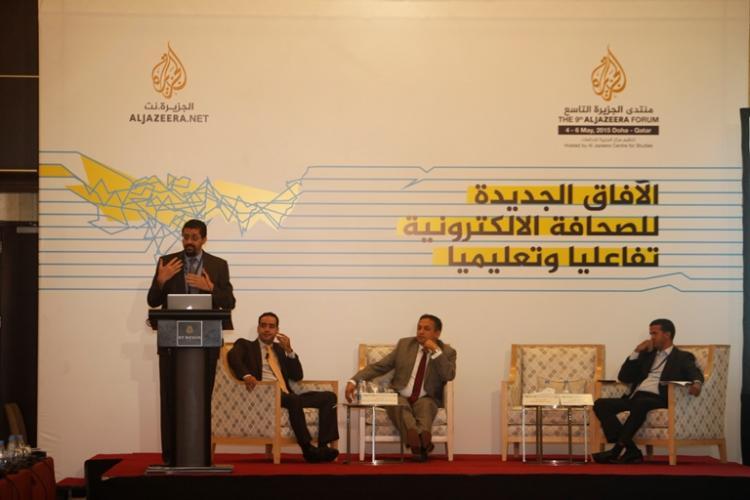
As part of the 9th Al Jazeera Forum, which commenced on 4 May in Doha, Al Jazeera Net organised a seminar entitled "New Interactive and Educational Horizons of E-Journalism," wherein specialists discussed the difficulties facing Arab migrants in teaching their children the Arabic language. They also highlighted the importance of digital education and the experience of Al Jazeera Net in this field.
In this context, Dr. Sawsan Al-Sadafi, director of programs at the Future Institute in Paris (FIP), stated that "the strategy of teaching the Arabic Language to non-native speakers must adapt to and draw the features of the lives of future generations and their conditions interactively".
She also noted that the Arabic language, despite migrants’ increasing demand for it, faced many obstacles to its global expansion including the lack of opportunities for learning it in schools, in turn resulting in weak fluency among the children of migrant families.
She warned that the Arabic language is no longer an option for future professional education in spite of its successful introduction and integration in Western countries, suggesting that "we must admit that the time allocated for practicing this language is not enough to make it a living language among Arab communities".
Obstacles
Moreover, Al-Sadafi maintained that among the obstacles facing the Arabic language in countries of emigration was that the younger generations perceived it as interactively and socially foreign. Thus, sporadically, those generations end up suffering from acute psychological problems and feelings of alienation even from themselves.
“At our institution”, she explained, “we were able to finally establish in the minds of our students that they were first Muslims, then Europeans. This has helped them lead a better life thanks to curricula and lessons objectively formed to cultivate the Arabic Language in its new Western reality”.
Digital Education
Mohammed bin Masood, director of programs at Afaq Group, stressed the importance of digital education as a replacement to traditional education, calling for the improvement of the educational process to become more compatible with modern technology to improve students' potential for education, understanding, and practice.
He revealed that the Arab world is facing several challenges in transforming its traditional educational system into a digital one, underlining that the most notable of these challenges include being dragged into irredeemable investment not needed by educational institutions. However, he affirmed that digital education meant reducing expenses, not vice versa.
In addition, he asserted that the continuous improvement of content is necessary in order to successfully facilitate the shift to digital education. This can only be implemented by assigning the mission to educational institutions and specialists that are capable of using and integrating it with modern technology as well as determining clear standards of success and failure.
Concluding his speech, he avowed, "Modern research and studies proved that digital learning has outdone traditional learning in recent years and will maintain its excellence, which we should capitalize on to create new generations capable of leading development in their countries through globally adopted and modern methods.
Pioneering Experience
Dr. Mokhtar Ahmed, linguistic supervisor at Al Jazeera's distance learning Arabic language website, discussed the experience of the website, highlighting the most positive results it has reached ever since its creation. He also talked about the objectives behind this specialised website. "The website comes within the context of Al Jazeera's initiative to benefit from modern technology to promote and serve the Arab-Muslim civilization everywhere", he asserted.
He noted that the Arabic language learning portal offered daily drills for beginners and weekly sessions for intermediate students, and that it uses real-time media material addressing the problems of daily life whether they are economic, health-related, or political. Such an approach allows the addressee to make the most out of the sessions, given that they understand the language in which the courses are offered.
Additionally, he discussed the most important techniques used in this field: reading, writing, listening, and speaking. These features are introduced through the diversity and interactivity of services rendering this task a success; meanwhile, the team offers miscellaneous services like dictionary, punctuation, grammatical analysis, translation, and repetition of proper pronunciation.
Conclusively, he said that Al Jazeera plays provides a platform for those who have no platform to voice their views and, through this website, an educational provider for the uneducated or disadvantaged who wish to learn Arabic but lack the financial means to join specialised institutions or universities.
The second part of the session organised by Al Jazeera Net focused on the "Tools and Problems and Arabic Language" in which experts asserted that the challenges emerging from the weakness of Arabic language content comes from the inability to keep up with technology. The percentage of informational content available online in Arabic does not exceed 3%, 80% of which is useless.
The speaker argued that this resulted from the challenges of using internet in the Arab world including the weakness of online content and blocked information. Therefore, a massive segment of online users were using other languages in research engines, whereas 41% of users saw that the shortage of the content stopped them from doing research in their native language.

